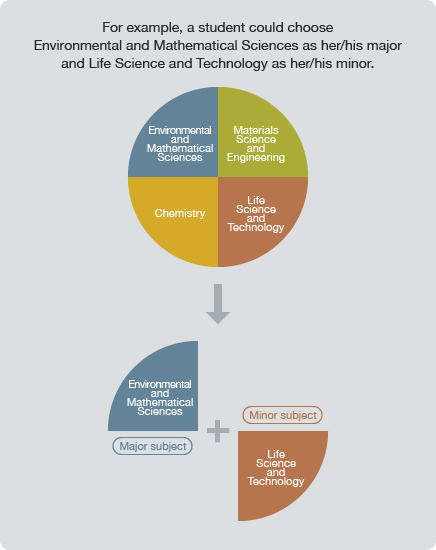- TOP
- Academics
- Undergraduate Schools
- School of Engineering Science
School of Engineering Science
Pioneering a new academic field by pursuing the basics of earth-friendly science and engineering and applied technology
Through the major/minor system, acquiring integrated capabilities with scientific knowledge and engineering sense
Taking 'environment' as its keyword, the School of Engineering Science has been promoting integrated research and education in various domains of physics, chemistry and biology. Through our system of four majors (Environmental and Mathematical Sciences, Chemistry, Life Science and Technology, and Materials Science and Engineering) we aim to deepen the disciplines by taking a 'science x engineering' approach rather than 'science + engineering.' In that way we will be able to foster human resources with integrated capabilities built upon scientific knowledge and engineering sense.
'Science' explores the foundations of the mechanisms of the natural world using mathematical languages, while 'Engineering' aims at the development of technology for the benefit of humanity, based on a rational understanding of the world. Some tensions may arise between these two approaches, as a result of differences in their intrinsic values, but still the two are in a complementary relationship, mutually dependent. For those who will be involved in the research and development of science and technology, learning both sets of values and acquiring a broader perspective incorporating both will be essential in the future, along with learning technical aspects of individual fields.
Aiming to cultivate human resources who will be pioneers of their era and will assume the leadership of the next generation
Consideration for the environment is urgently needed in all domains of human activities, not just in manufacturing. The School of Engineering Science offers advanced environment literacy education through various approaches to the study of the environment. We aim to cultivate human resources with not only a mastery of expert level knowledge and skills in each major and with broad cultural awareness, but also having a full command of the basics of science and engineering as they relate to rapidly changing and evolving technology.
Unique curriculum offering broad knowledge
Pioneering the future with our two-pronged approach to contemporary science and engineering, with their ever-expanding fusion and interdisciplinary work
Just as molecular biology depends on knowledge of both biology and chemistry, and material science work requires knowledge of both physics and chemistry, currently in the fields of science and engineering we see more and more fusion and interdisciplinary work, so it is essential to have expertise in multiple fields. In that emergent atmosphere, the School of Engineering Science educates students within a system of majors and minors. Using this two-pronged approach (major and minor subjects) we will continue to extend the potential of the students, even after graduation. The demand for human resources with broad knowledge, deep expertise and solid environmental literacy capability is growing in companies and research institutes--and in the field of education as well. Furthermore, assuming a broad vision of the future, the School of Engineering Science emphasizes support for students who intend to proceed to graduate school.

Majors
- Applied Physics
- Functional Chemistry
- Life and Bioinformation Science
*Majors in 2022 or earlier
- Environmental and Mathematical Sciences
- Chemistry
- Life Science and Technology
- Materials Science and Engineering
